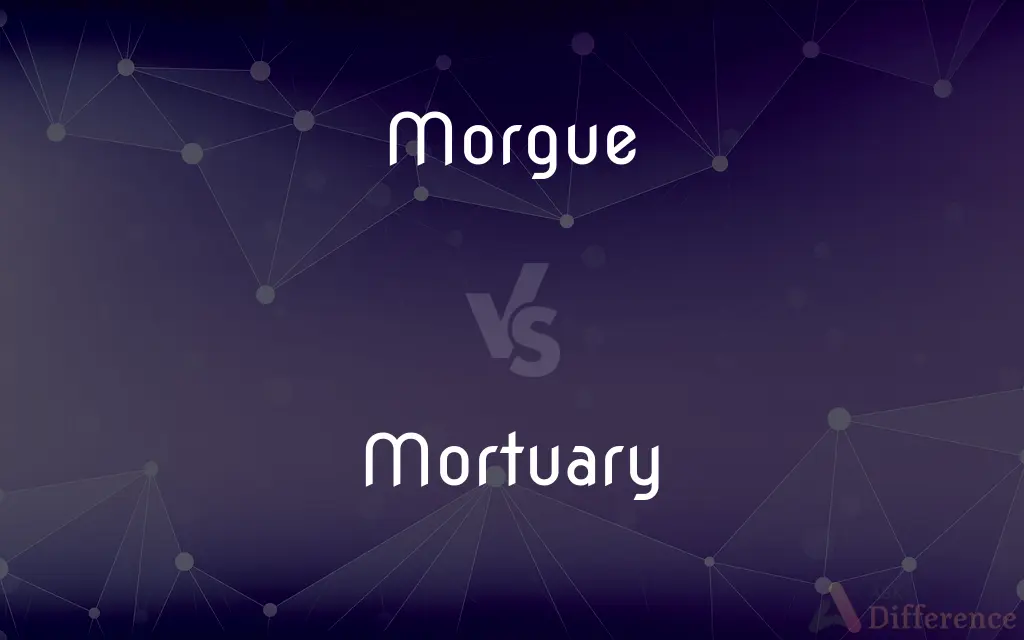Morgue vs. Mortuary — What's the Difference?
By Tayyaba Rehman — Updated on November 1, 2023
Morgue refers to a place where dead bodies are kept for identification or until burial, whereas a mortuary is a place where dead bodies are stored and prepared for funeral services.

Difference Between Morgue and Mortuary
Table of Contents
ADVERTISEMENT
Key Differences
In discussions of facilities related to the deceased, morgue and mortuary often come up. A morgue primarily serves as a storage place for bodies, especially for identification and postmortem examinations. Mortuaries, however, extend their services to include the preparation of the body for burial or cremation.
The term "morgue" suggests a clinical setting, often associated with hospitals, where bodies are examined, identified, and sometimes autopsied. The term "mortuary" implies a more extensive range of services that can include embalming, viewing of the deceased for family members, and coordination with funeral services.
Morgues are often thought of as temporary holding facilities, while mortuaries might offer more permanence until the final disposition of the body. One might say that the morgue is where the investigation of a death might begin, and the mortuary is where the final preparations for a funeral are made.
While in common usage the terms may sometimes be used interchangeably, in the professional world, the distinction is clearer, with each playing a specific role in the post-death process. Differentiating between the two is important for understanding the services offered at each type of facility.
Comparison Chart
Primary Function
Holding and identification of bodies.
Preparation and storage of bodies for funeral services.
ADVERTISEMENT
Associated Services
Autopsies, forensic examinations.
Embalming, funeral arrangements.
Duration of Stay
Short-term until identification or autopsy is complete.
Longer-term until the funeral service.
Typical Location
Hospitals, medical examiners' offices.
Funeral homes, independent facilities.
Professional Focus
Pathologists, medical examiners.
Funeral directors, embalmers.
Compare with Definitions
Morgue
A place where bodies are kept for identification.
The detective went to the morgue to examine the body.
Mortuary
A funeral home or facility for storing bodies before funeral services.
The family gathered at the mortuary to say their last goodbyes.
Morgue
An office in a newspaper where old files and news clippings are kept.
She dug through the morgue for articles on the case.
Mortuary
A place associated with death and funeral rites.
The mortuary offered various funeral packages.
Morgue
A cold, unwelcoming place or situation.
The abandoned house felt like a morgue.
Mortuary
A facility that provides services related to the deceased.
They sent flowers to the mortuary for the service.
Morgue
A facility associated with forensic science.
Forensic students toured the morgue as part of their studies.
Mortuary
A place, especially a funeral home, where dead bodies are kept before burial or cremation.
Morgue
A morgue or mortuary (in a hospital or elsewhere) is a place used for the storage of human corpses awaiting identification or removal for autopsy or respectful burial, cremation or other method. In modern times, corpses have customarily been refrigerated to delay decomposition.
Mortuary
Of or relating to burial practices.
Morgue
A place in which the bodies of persons found dead are kept until identified and claimed or until arrangements for burial have been made.
Mortuary
Relating to or characteristic of death.
Morgue
A reference file in a newspaper or magazine office.
Mortuary
Of, or relating to death or a funeral; funereal.
Morgue
(archaic) A supercilious or haughty attitude; arrogance.
Mortuary
A place where dead bodies are stored prior to burial or cremation.
Morgue
A building or room where dead bodies are kept before their proper burial or cremation, particularly in legal and law enforcement contexts.
Mortuary
(historical) A sort of ecclesiastical heriot, a customary gift claimed by, and due to, the minister of a parish on the death of a parishioner.
Morgue
(archaic) The archive and background information division of a newspaper.
Kwapil, Joseph F. (2 July 1921) "Librarian Talks of Newspaper Morgue", Fourth Estate [http://books.google.com/books?id=vws-AQAAMAAJ&pg=PA5 page 5].
Mortuary
A sort of ecclesiastical heriot, a customary gift claimed by, and due to, the minister of a parish on the death of a parishioner. It seems to have been originally a voluntary bequest or donation, intended to make amends for any failure in the payment of tithes of which the deceased had been guilty.
Morgue
A place where the bodies of dead persons are kept, until they are identified, or claimed by their friends; a deadhouse.
Mortuary
A burial place; a place for the dead.
Morgue
A room containing reference files of older material in a newspaper office; also, the material contained in such a room.
Mortuary
A place for the reception of the dead before burial; a deadhouse; a morgue.
Morgue
A building (or room) where dead bodies are kept before burial or cremation
Mortuary
A funeral home.
Morgue
A room or building in which dead bodies are kept, pending identification or autopsy.
The hospital morgue was located in the basement.
Mortuary
Of or pertaining to the dead; as, mortuary monuments.
Mortuary
A building (or room) where dead bodies are kept before burial or cremation
Mortuary
Of or relating to or characteristic of death
Mortuary
Of or relating to a funeral
Mortuary
A room or building where dead bodies are prepared for burial or cremation.
The mortuary was booked for the embalming services.
Mortuary
Pertaining to the burial or cremation of the dead.
Mortuary customs vary widely among cultures.
Common Curiosities
Are morgue and mortuary the same?
No, a morgue is for holding bodies, often for investigation, while a mortuary prepares them for funeral services.
Are all mortuaries part of funeral homes?
Most are, but there can be standalone mortuaries.
Is refrigeration used in both morgues and mortuaries?
Yes, to preserve bodies in both settings.
Do mortuaries handle autopsies?
Usually, autopsies are conducted in a morgue.
Who works in a morgue?
Medical examiners, pathologists, and mortuary technicians.
Can families hold services in a mortuary?
Yes, many mortuaries have facilities for memorial services.
Are morgues open to the public?
No, morgues have restricted access due to the sensitive nature of their work.
Do mortuaries offer grief counseling?
Some do as part of their funeral services.
Can bodies be viewed in a morgue?
It's possible for identification purposes, but viewings typically happen in a mortuary.
Do you need an appointment to visit a morgue?
Typically, yes, visits are controlled and require authorization.
Is embalming done in a morgue?
No, embalming is a mortuary service.
Can a body go from a morgue to a mortuary?
Yes, it's common for bodies to be transferred to a mortuary after morgue procedures are complete.
Can one donate a body to a morgue?
Donation usually goes to medical facilities, not morgues specifically.
Who operates mortuaries?
Funeral directors and embalmers.
Are funeral products sold at mortuaries?
Yes, many mortuaries sell caskets, urns, and other funeral goods.
Share Your Discovery

Previous Comparison
Infirmity vs. Sickness
Next Comparison
Champagne vs. ChampersAuthor Spotlight
Written by
Tayyaba RehmanTayyaba Rehman is a distinguished writer, currently serving as a primary contributor to askdifference.com. As a researcher in semantics and etymology, Tayyaba's passion for the complexity of languages and their distinctions has found a perfect home on the platform. Tayyaba delves into the intricacies of language, distinguishing between commonly confused words and phrases, thereby providing clarity for readers worldwide.














































